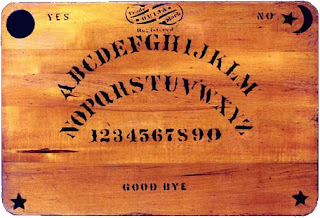A mention of talking boards is occasionally met with a joke asking what a piece of lumber could possibly have to say, but when I say the words "Ouija Board," the discussion tends to take a more serious turn.
In the 1840s a pair of New York sisters claimed to contact the spirit of a dead peddler and sparked a national movement. Spiritualism was born, and America, and soon the world, became obsessed with afterlife communication.
The obsession only grew during and after the Civil War. With more than 700,000 deaths during the national conflict, it meant that hardly anyone was untouched by death, and grieving individuals wished to connect with those family members they had lost.
Many mediums practiced automatic writing, and quite a few began to employ talking boards as a means to make the practice easier. Rather than using a pen, which had to be dipped in ink, the operator could simply move a planchette across a wooden board while the letters or words were called out by an assistant.
In 1890, Elijah Bond filed for a patent, and the talking board was commercially introduced and mass marketed as a "parlor game." Then in1901, William Fuld began production of his own board under the name "Ouija," and a new phenomenon was born.
While many religious institutions and people decry the Ouija board as evil or demonic, there is no proof that it can actually be used to contact the spirit world. Scientists believe any and all movement of the planchette around the board is directly the result of ideomotor response, or unconscious motions made by the "operators" that are triggered by their subconscious thoughts.
Therefore, any responses are triggered by what is already deep in the operator's subconscious. If the operator approaches the session expecting to hear from Aunt Margaret, then that is probably who will "appear." If they're afraid a demon will show itself, then that is, most likely, what will be "contacted." What is expected is most likely the result.
Because I'm sure the question will be asked, allow me to provide you with the answer up front. Yes, I've tried a talking board, both "generic" ones and an actual, name brand Ouija Board. They didn't work. I've tried with multiple partners and there was only one time that there were any "results." What we were "told" couldn't be verified, so I don't consider that one session as proof of anything. Other than that, it's been zero. No revelations of buried treasure. No family secrets revealed. No demonic spirits or possessions. The planchette just sat there.
I honestly believe that if you go into a talking board session expecting a certain result, you'll receive it because of your own subconscious. I try to go into each session with an absolutely clear mind, no one result pictured or imagined, and I'm rewarded with a clear message, nothing there.
In all honesty, I believe talking boards to be a waste of money. As much as I love the idea of using them to contact loved ones, I feel hard-earned money is best spent elsewhere.

Comments
Post a Comment